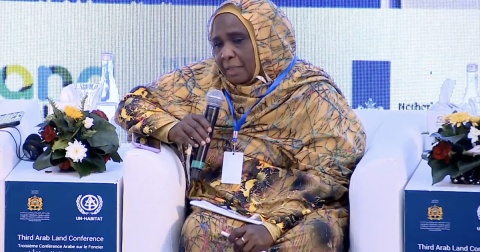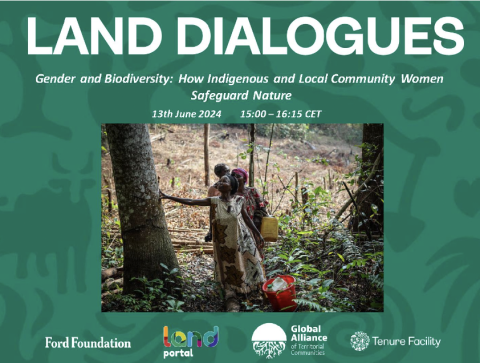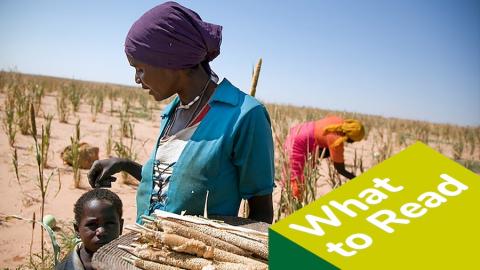Discover hidden stories and unheard voices on land governance issues from around the world. This is where the Land Portal community shares activities, experiences, challenges and successes.
 Follow our
Follow our
Sustainable Development Goals
Blog Series!
Interested in land corruption?
Follow our Land & Corruption Blog Series
for in-depth perspectives from the experts.
Issues
Geographical focus
Photo: Fungai Nyikadzino in her field where the harsh sun and low rainfall devastated her crops in southern Zimbabawe. She has now received improved seeds and goats from Oxfam and partners in an initiative aimed at improving livelihoods in the arid region. (Picture: Loliwe Phiri / Oxfam)
The Third Arab Land Conference, held in Rabat, Morocco from 18-20 February 2025 opened an avenue of possibilities for improving policies and practices to govern land in the Arab world. From the launch of several groundbreaking initiatives to empowering women and youth, and fostering data transparency and academic excellence, the event showcased commitments and collaborative work shaping the future of land governance in the region.
Reflections from the Third Arab Land Conference and the LAND-at-scale Regional Day
Land is more than just a resource—it is the foundation of livelihoods, economic stability, and social justice. Responsible land governance plays a crucial role in sustainable development, conflict prevention, and climate resilience. These themes were central to the Third Arab Land Conference which took place the 18-20th February 2025 in Morocco, where policymakers, experts, and civil society organizations gathered to discuss pressing land challenges in the region.
On International Women’s Day, we reflect on the intersection of land rights and gender equity through a compilation of resources featured on the Land Portal’s platform. Women’s access to and control over land is fundamental to achieving sustainable development, economic empowerment, and social justice. However, despite international commitments, structural barriers continue to hinder women’s full participation in land governance.
Third Arab Land Conference Session Summary
Women’s secure access to land, housing, and resources is a fundamental pillar of economic stability, social inclusion, and sustainable development. Across the Arab region, however, legal barriers, customary norms, and institutional challenges continue to restrict women’s land tenure rights, limiting their ability to invest, build wealth, and participate in decision-making.
Professor Anju Vali Tikoo, a distinguished academic with a career spanning over three decades, delivered a passionate and incisive keynote at the 8th India Land and Development Conference (ILDC). Her address, a clarion call for gender inclusivity in land governance, explored the intersection of law, policy, and lived realities for women in India. With her deep-rooted knowledge of legal frameworks and her personal experiences, Prof. Tikoo brought to light the systemic barriers that continue to marginalize women in matters of land ownership and decision making.
India has made significant strides in empowering women over the past few decades, starting with self-help groups (SHGs) that became powerful vehicles for social inclusion. Government and NGO efforts later expanded to skilling and livelihood initiatives, helping women increase their income and build small businesses within their communities. Yet, despite this progress, the urgent need remains for a long-term, sustainable solution to women's empowerment.
It’s a bumper year for citizens of the world to participate in their own governance. Elections are happening almost every other week. Record numbers of countries are holding presidential or parliamentary national or local elections, in democracies and in less democratic political systems. Governments are turning over, expectedly or unexpectedly, or becoming entrenched. Electorates are turning out in great numbers, to punish or endorse, or voting out of the system by staying home.
A Strategic Pivot for the Sustainable Development Goals (SDGs) Promise
Inclusive land governance is critical to securing land rights and achieving the Sustainable Development Goals (SDGs). Secured land rights are foundational for sustainable development, with the access, control and use of land presenting significant responsibilities for governments and their legal systems. Equitable land governance ensures fair access to land, which drives economic growth, reduces poverty, and promotes environmental sustainability.
Under the umbrella of the Land Dialogues series, the first webinar of this year’s series “Gender and Biodiversity : How Indigenous and Local Community Women Safeguard Nature” took place on June 13th, 2024. The webinar drew in a little over 300 participants and featured Indigenous and local community leaders from around the world. The series is organized by a consortium of organizations, including the Land Portal Foundation, the Ford Foundation and the Tenure Facility and this particular webinar was organized in collaboration with the GATC.
Our latest What to Read digest said:
Fact one, some studies suggest that women are responsible for half of the world's food production, and in some developing nations they produce between 60 and 80 percent of the food.
Our partners at Landesa and International Food Policy Research Institute responded and alerted us that these figures are greatly contested.
Photo by Albert Gonzalez Farran / UNAMID, women working in the farm, license (CC BY-NC-ND 2.0 DEED)
This digest has been updated on 11 March 2024. Our partners alerted us that one of the figures we used is highly contested. The full clarification is below. We have also included a fourth article to the digest, which was missing in the original post, that contests the 'myth' statistic.
CLARIFICATION












